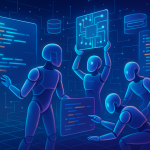Remember Y2K? The world held its breath, bracing for digital Armageddon as the clock ticked over to the year 2000. Planes were going to fall from the sky, banks were going to collapse, and our toasters would rise up in revolt. While the reality was far less dramatic, the anxiety was palpable. Fast forward twenty-five years, and a new technological specter looms large: Artificial Intelligence. But this time, instead of fearing a system crash, we’re worried about a job crash.
A newly released Senate Democrat report, spearheaded by Senator Bernie Sanders, is sounding the alarm, predicting that AI and automation could vaporize a staggering 100 million U.S. jobs within the next ten years. That’s roughly one-third of the entire American workforce gone, poof, like Marty McFly fading from a photograph.
The report, ironically leveraging the very AI it warns about (ChatGPT was used in the analysis), paints a grim picture of “artificial labor” sweeping across industries, leaving both white-collar and blue-collar workers in its wake. We’re not just talking about robots replacing factory workers anymore; we’re talking about AI algorithms potentially taking over tasks performed by accountants, lawyers, writers, and even, dare I say, bloggers (gulp!).
Sanders didn’t mince words, blasting corporations for their relentless pursuit of profit at the expense of decent-paying jobs. He argues that the unchecked adoption of AI will only exacerbate existing wealth inequality, concentrating power in the hands of a few tech giants while leaving millions struggling to find their place in a rapidly changing economy. It’s a familiar refrain, echoing concerns about automation that have been around since the dawn of the Industrial Revolution, but with a distinctly 21st-century twist.
The Democrats aren’t just ringing the alarm bell; they’re proposing solutions. Their policy wish list includes measures like a 32-hour workweek (finally, more time to binge-watch Netflix!), profit-sharing initiatives (so workers can actually benefit from the AI revolution), and, perhaps most controversially, a “robot tax” (making companies pay for the robots that are taking over jobs). It’s a bold vision, reminiscent of some of the more ambitious proposals from the New Deal era.
But, as always, there’s another side to the story. Republicans are pushing back hard, arguing that excessive regulation could stifle innovation and hand China a significant advantage in the global AI race. They warn that over-regulation could cripple American companies’ ability to compete, ultimately hurting the economy in the long run. It’s the classic debate between protecting workers and fostering economic growth, a tension that has defined American politics for decades.
The report also takes a swipe at the previous administration’s AI policies, accusing them of favoring deregulation and empowering tech industry insiders. It’s a reminder that the AI debate is deeply intertwined with partisan politics, with each side viewing the technology through a very different lens.
So, what does this all mean? Let’s break it down:
The Technical Nuts and Bolts
The report’s analysis likely focuses on the increasing sophistication of AI models, particularly large language models (LLMs) like ChatGPT. These models, trained on massive datasets, can now perform tasks that were once considered the exclusive domain of human intelligence. They can write code, generate marketing copy, answer legal questions, and even diagnose medical conditions with increasing accuracy. As these models become more powerful and affordable, businesses are increasingly tempted to replace human workers with AI-powered solutions.
Who’s in the Crosshairs?
The report suggests that a wide range of industries are vulnerable. Manufacturing and transportation are obvious targets, as robots and self-driving vehicles become more prevalent. But the impact could extend far beyond those sectors. Customer service representatives, data entry clerks, accountants, paralegals, and even journalists could find themselves competing with AI-powered alternatives. The rise of AI-generated art and music also raises questions about the future of creative professions.
The Ethical Minefield
The AI revolution raises a host of ethical questions. What happens to the millions of workers who are displaced by automation? How do we ensure that AI systems are fair and unbiased? How do we prevent AI from being used for malicious purposes? These are complex questions with no easy answers. We need to have a serious conversation about the ethical implications of AI before it’s too late. It’s not just about technological progress; it’s about building a future that is both prosperous and just.
The Economic Earthquake
The potential economic impact of AI is enormous. If 100 million Americans lose their jobs, the consequences could be devastating. Unemployment rates could skyrocket, consumer spending could plummet, and the social safety net could be overwhelmed. On the other hand, AI could also create new jobs and boost productivity, leading to economic growth. The challenge is to manage the transition in a way that benefits everyone, not just a select few. This means investing in education and retraining programs, strengthening social safety nets, and exploring new economic models that are better suited to an AI-powered world.
The Philosophical Pandora’s Box
Ultimately, the AI debate is about more than just jobs and economics. It’s about the very nature of work, the meaning of human existence, and our relationship with technology. Are we destined to become slaves to the machines, or can we harness AI to create a better world for all? The answer, I suspect, lies somewhere in between. We need to approach AI with both optimism and caution, embracing its potential while mitigating its risks. The future is not predetermined; it’s up to us to shape it.
So, the next time you hear someone talking about AI, remember that it’s not just a futuristic fantasy; it’s a real and present challenge. And it’s a challenge that we all need to face together.
Discover more from Just Buzz
Subscribe to get the latest posts sent to your email.


